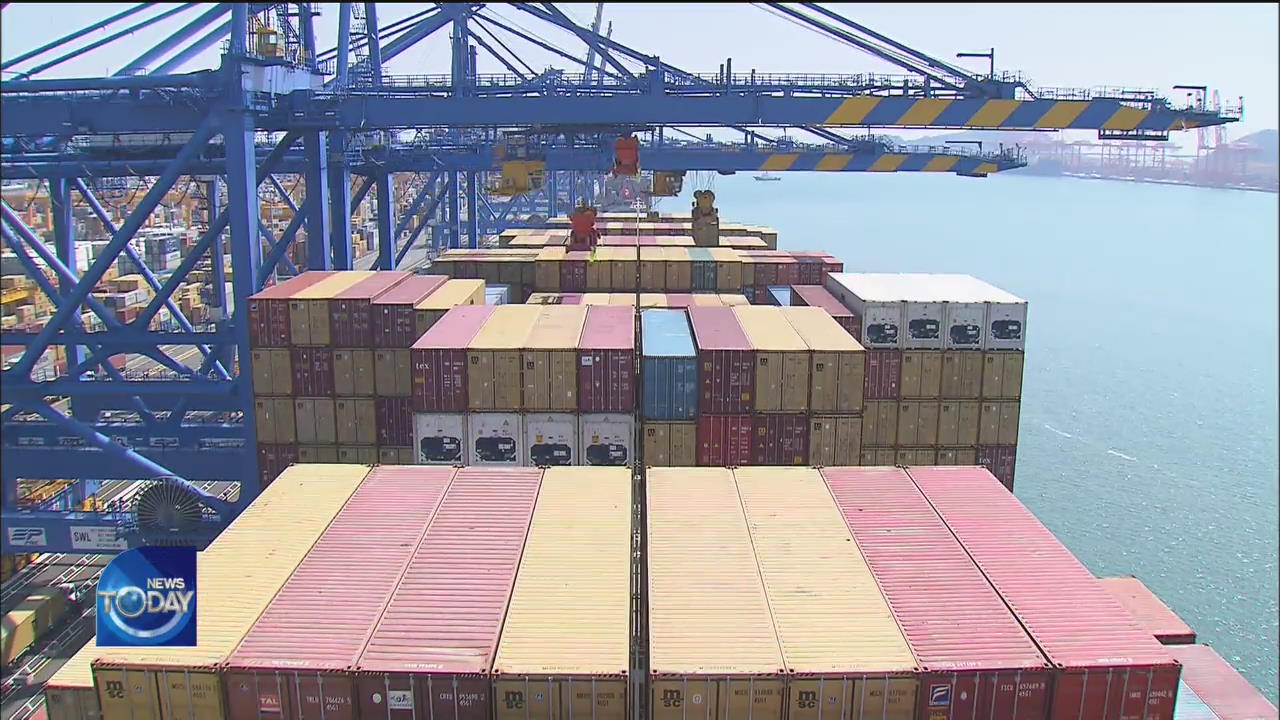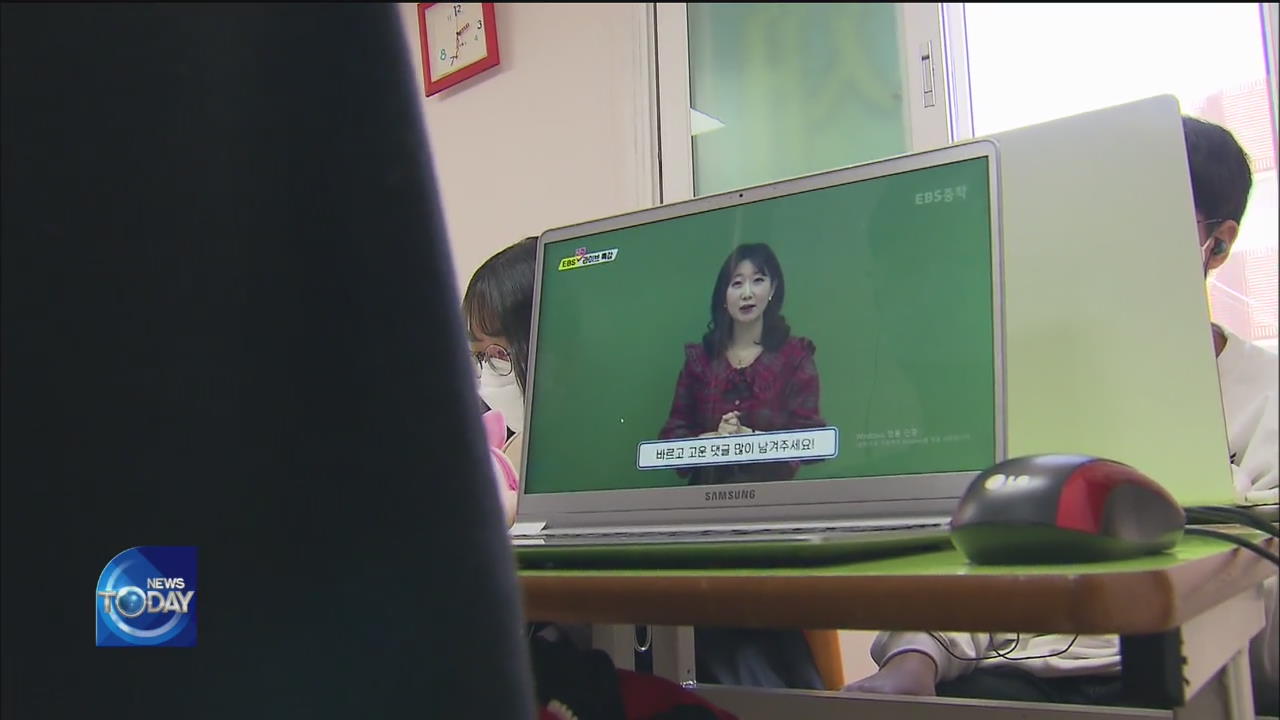COVID-19 AFFECTS KOREA'S IT FIRMS
입력 2020.04.02 (15:22)
수정 2020.04.02 (16:45)
읽어주기 기능은 크롬기반의
브라우저에서만 사용하실 수 있습니다.
[Anchor Lead]
The COVID-19 pandemic has dealt serious blows to Korea's key export industries, such as mobile phones, TVs and even semiconductors. Here's an overview of the serious predicament faced by Korean electronics giants.
[Pkg]
Best Buy, the largest electronics and home appliance franchise in America. In one of its stores. Its doors are shuttered, the parking lot empty. The situation is the same for roughly one thousand Best Buy chains across the states. This is devastating news for Korean-made appliances.
[Soundbite] (OFFICIAL OF A KOREAN APPLIANCE MAKER(VOICE MODIFIED)) : "Americans like to purchase TVs and other appliances in stores. Haven't you seen them shop on Black Friday? The impact of such decline in sales is greater than that of online stores."
Media Markt, the largest appliance outlet in Europe, has closed its 850 stores as well. LG and Samsung plants all over the globe have suspended operations. They have nowhere to make or sell their products. This has never happened before. But they still had the 2020 Olympics to look forward to. Unfortunately that last remaining hope was dashed when the Tokyo games were postponed. This year's outlook for worldwide TV sales now stands at minus 9%.
[Soundbite] (OFFICIAL OF A KOREAN APPLIANCE MAKER(VOICE MODIFIED)) : "The demand will shrink without the Olympics and with the struggling economy."
What about Korea's export powerhouse, the semiconductor industry? One-third of the global semiconductor memory supply is used in smartphones, but the sales of these tech products in February already fell by 14%. The smaller contractors are especially vulnerable to such crisis. Samsung Electronics alone has some 600 primary contractors in the nation. The number would amount to thousands if fourth-level contractors are included.
[Soundbite] YOO JONG-WOO(KOREA INVESTMENT & SECURITIES) : "Smartphone makers were impacted after mid-March and the situation would get worse in the second quarter. Then the demand for parts will naturally plunge."
Is there no way to cushion the impact orreverse the trend? Semiconductor accounts for 20% of Korea's export. The sector performed admirably and saw its outbound shipments go up in March. Demand for semiconductors rose with the emergence of 'untact' marketing, a newly coined term for no contact IT-based marketing. Also, Seoul's export to Beijing has recovered as the spread of COVID-19 slowed down in China. Judging by these encouraging signs, consumption is likely to explode after the pandemic is contained. That's why businesses of all sizes must work together to hold on and make it through this difficult time.
The COVID-19 pandemic has dealt serious blows to Korea's key export industries, such as mobile phones, TVs and even semiconductors. Here's an overview of the serious predicament faced by Korean electronics giants.
[Pkg]
Best Buy, the largest electronics and home appliance franchise in America. In one of its stores. Its doors are shuttered, the parking lot empty. The situation is the same for roughly one thousand Best Buy chains across the states. This is devastating news for Korean-made appliances.
[Soundbite] (OFFICIAL OF A KOREAN APPLIANCE MAKER(VOICE MODIFIED)) : "Americans like to purchase TVs and other appliances in stores. Haven't you seen them shop on Black Friday? The impact of such decline in sales is greater than that of online stores."
Media Markt, the largest appliance outlet in Europe, has closed its 850 stores as well. LG and Samsung plants all over the globe have suspended operations. They have nowhere to make or sell their products. This has never happened before. But they still had the 2020 Olympics to look forward to. Unfortunately that last remaining hope was dashed when the Tokyo games were postponed. This year's outlook for worldwide TV sales now stands at minus 9%.
[Soundbite] (OFFICIAL OF A KOREAN APPLIANCE MAKER(VOICE MODIFIED)) : "The demand will shrink without the Olympics and with the struggling economy."
What about Korea's export powerhouse, the semiconductor industry? One-third of the global semiconductor memory supply is used in smartphones, but the sales of these tech products in February already fell by 14%. The smaller contractors are especially vulnerable to such crisis. Samsung Electronics alone has some 600 primary contractors in the nation. The number would amount to thousands if fourth-level contractors are included.
[Soundbite] YOO JONG-WOO(KOREA INVESTMENT & SECURITIES) : "Smartphone makers were impacted after mid-March and the situation would get worse in the second quarter. Then the demand for parts will naturally plunge."
Is there no way to cushion the impact orreverse the trend? Semiconductor accounts for 20% of Korea's export. The sector performed admirably and saw its outbound shipments go up in March. Demand for semiconductors rose with the emergence of 'untact' marketing, a newly coined term for no contact IT-based marketing. Also, Seoul's export to Beijing has recovered as the spread of COVID-19 slowed down in China. Judging by these encouraging signs, consumption is likely to explode after the pandemic is contained. That's why businesses of all sizes must work together to hold on and make it through this difficult time.
■ 제보하기
▷ 카카오톡 : 'KBS제보' 검색, 채널 추가
▷ 전화 : 02-781-1234, 4444
▷ 이메일 : kbs1234@kbs.co.kr
▷ 유튜브, 네이버, 카카오에서도 KBS뉴스를 구독해주세요!
- COVID-19 AFFECTS KOREA'S IT FIRMS
-
- 입력 2020-04-02 15:26:23
- 수정2020-04-02 16:45:16

[Anchor Lead]
The COVID-19 pandemic has dealt serious blows to Korea's key export industries, such as mobile phones, TVs and even semiconductors. Here's an overview of the serious predicament faced by Korean electronics giants.
[Pkg]
Best Buy, the largest electronics and home appliance franchise in America. In one of its stores. Its doors are shuttered, the parking lot empty. The situation is the same for roughly one thousand Best Buy chains across the states. This is devastating news for Korean-made appliances.
[Soundbite] (OFFICIAL OF A KOREAN APPLIANCE MAKER(VOICE MODIFIED)) : "Americans like to purchase TVs and other appliances in stores. Haven't you seen them shop on Black Friday? The impact of such decline in sales is greater than that of online stores."
Media Markt, the largest appliance outlet in Europe, has closed its 850 stores as well. LG and Samsung plants all over the globe have suspended operations. They have nowhere to make or sell their products. This has never happened before. But they still had the 2020 Olympics to look forward to. Unfortunately that last remaining hope was dashed when the Tokyo games were postponed. This year's outlook for worldwide TV sales now stands at minus 9%.
[Soundbite] (OFFICIAL OF A KOREAN APPLIANCE MAKER(VOICE MODIFIED)) : "The demand will shrink without the Olympics and with the struggling economy."
What about Korea's export powerhouse, the semiconductor industry? One-third of the global semiconductor memory supply is used in smartphones, but the sales of these tech products in February already fell by 14%. The smaller contractors are especially vulnerable to such crisis. Samsung Electronics alone has some 600 primary contractors in the nation. The number would amount to thousands if fourth-level contractors are included.
[Soundbite] YOO JONG-WOO(KOREA INVESTMENT & SECURITIES) : "Smartphone makers were impacted after mid-March and the situation would get worse in the second quarter. Then the demand for parts will naturally plunge."
Is there no way to cushion the impact orreverse the trend? Semiconductor accounts for 20% of Korea's export. The sector performed admirably and saw its outbound shipments go up in March. Demand for semiconductors rose with the emergence of 'untact' marketing, a newly coined term for no contact IT-based marketing. Also, Seoul's export to Beijing has recovered as the spread of COVID-19 slowed down in China. Judging by these encouraging signs, consumption is likely to explode after the pandemic is contained. That's why businesses of all sizes must work together to hold on and make it through this difficult time.
The COVID-19 pandemic has dealt serious blows to Korea's key export industries, such as mobile phones, TVs and even semiconductors. Here's an overview of the serious predicament faced by Korean electronics giants.
[Pkg]
Best Buy, the largest electronics and home appliance franchise in America. In one of its stores. Its doors are shuttered, the parking lot empty. The situation is the same for roughly one thousand Best Buy chains across the states. This is devastating news for Korean-made appliances.
[Soundbite] (OFFICIAL OF A KOREAN APPLIANCE MAKER(VOICE MODIFIED)) : "Americans like to purchase TVs and other appliances in stores. Haven't you seen them shop on Black Friday? The impact of such decline in sales is greater than that of online stores."
Media Markt, the largest appliance outlet in Europe, has closed its 850 stores as well. LG and Samsung plants all over the globe have suspended operations. They have nowhere to make or sell their products. This has never happened before. But they still had the 2020 Olympics to look forward to. Unfortunately that last remaining hope was dashed when the Tokyo games were postponed. This year's outlook for worldwide TV sales now stands at minus 9%.
[Soundbite] (OFFICIAL OF A KOREAN APPLIANCE MAKER(VOICE MODIFIED)) : "The demand will shrink without the Olympics and with the struggling economy."
What about Korea's export powerhouse, the semiconductor industry? One-third of the global semiconductor memory supply is used in smartphones, but the sales of these tech products in February already fell by 14%. The smaller contractors are especially vulnerable to such crisis. Samsung Electronics alone has some 600 primary contractors in the nation. The number would amount to thousands if fourth-level contractors are included.
[Soundbite] YOO JONG-WOO(KOREA INVESTMENT & SECURITIES) : "Smartphone makers were impacted after mid-March and the situation would get worse in the second quarter. Then the demand for parts will naturally plunge."
Is there no way to cushion the impact orreverse the trend? Semiconductor accounts for 20% of Korea's export. The sector performed admirably and saw its outbound shipments go up in March. Demand for semiconductors rose with the emergence of 'untact' marketing, a newly coined term for no contact IT-based marketing. Also, Seoul's export to Beijing has recovered as the spread of COVID-19 slowed down in China. Judging by these encouraging signs, consumption is likely to explode after the pandemic is contained. That's why businesses of all sizes must work together to hold on and make it through this difficult time.
이 기사가 좋으셨다면
-
좋아요
0
-
응원해요
0
-
후속 원해요
0

















이 기사에 대한 의견을 남겨주세요.